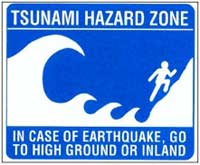

Some hotels on the Oregon coast are resisting a new tsunami awareness initiative.
The city of Seaside has given hotels key holders that contain warnings of a potential tsunami and evacuation instructions, in an effort to inform visitors about the risks, Fire Division Chief Chris Dugan said. Area hotels have the option to incorporate the sleeves into their safety plan.
The key sleeves are the main feature of Seaside’s new awareness initiative for hospitality industries. But while some hotels and other businesses are using them, The Daily Astorian reports others have “mixed emotions.”

Hotel patrons often gasp or respond with anxiety when they see the warnings, because being greeted up front with a tsunami warning while on vacation can be unnerving, said manager of the Hi-Tide Resort Debra Hudson.
No one has been appreciative of the warning, Hudson said, although she believes the key holders are effective for increasing awareness.
“It’s kind of a catch-22,” Hudson said, adding that her hotel may discontinue using them.
The key holders give instructions to drop, cover and hold on during an earthquake, then move inland quickly or use a local, evacuation route; and lastly, wait for an official “all clear” before returning to the beach.
The overall project cost of about $5,000 is financed through state funds and is free to the hotels.
Some hotels decided not to use the key sleeves. Best Western declined, citing a corporate policy that prohibits using any other key envelope but the ones corporate approves.
And Worldmark by Wyndham said it already has an evacuation plan that incorporates directing people to the facility’s parking structure, said Jon Rahl, director of tourism for the Seaside Visitors Bureau.
Sand & Sea, which does use the new tool, said guests haven’t had any negative reactions. The hotel also has binders in each unit with a page about tsunamis that provide evacuation instructions and maps.
“Any little bit of information will help them in case we do have a tsunami,” general manager Mary Vellutini said.
Finding a balance between enticing visitors to come to Seaside and spreading the word about potential hazards such as tsunamis “is something this community is always going to have a challenge with,” Dugan, the fire chief, said.
The state also offers hotels other products to warn visitors, including a Living on Shaky Ground magazine in English and Spanish, a two-sided poster on earthquakes and tsunamis, a printable table tent with information and an Oregon Tsunami Waves video that can be played on in-room television channels.